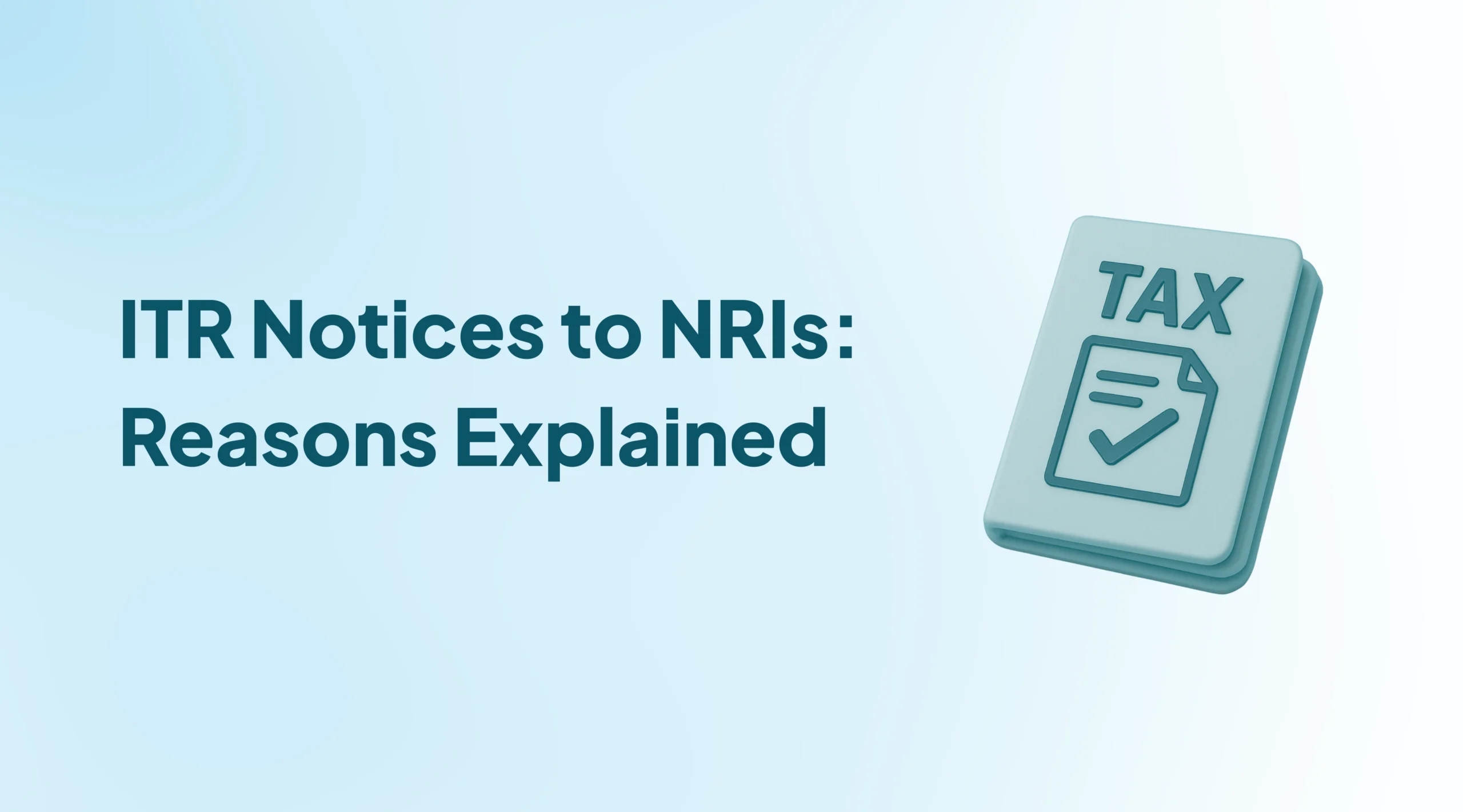When you live outside India but still have financial connections back home, the Indian tax system often feels like a long-distance relationship. You want things to stay simple, but sometimes you get an unexpected “message” in the form of an income tax notice.
For many NRIs, that notice sparks panic. Thoughts like “Did I do something wrong?” or “Can this affect me abroad?” rush in. The truth is, income tax notices are more common than you think. Most of them are triggered by mismatched data or missing documents, not because you did anything fraudulent.
In this guide, we’ll walk through the types of notices, the reasons NRIs get them, and what steps you can take if one lands in your inbox. By the end, you’ll know not only how to respond but also how to prevent repeat headaches.
Why Do NRIs Receive Income Tax Notices?
Imagine you buy a property in India and sell it a few years later. The bank deducts TDS on the sale. The Income Tax Department gets this report. But if your ITR doesn’t reflect the sale correctly, the system notices the mismatch. That’s one trigger.
Other common reasons include:
- AI-enabled tracking – The department’s systems now match your data across AIS, Form 26AS, and SFTs. Think of it like three cameras catching the same car from different angles. If one shows something missing, you’ll hear from them.
- High-value transactions – Buying or selling property, sending large remittances, or making big NRO/NRE deposits can trigger scrutiny.
- DTAA claims – Claiming treaty benefits without proper documents like TRC (Tax Residency Certificate) or Form 10F often raises questions.
- Rental income mismatches – If your tenant deducts TDS but you don’t show the rental income in your return, expect a notice.
A few years ago, an NRI friend of mine sold a flat in Bangalore. He assumed the buyer’s TDS deduction settled everything. But he didn’t file a return reflecting the sale. A Section 148 notice landed in his email six months later. The problem wasn’t that he skipped taxes. It was that he didn’t declare the transaction.
Common Types of Income Tax Notices for NRIs
Let’s break down the notices you’re most likely to see.
e-Campaign Notice – Non-Filing of ITR
This is like a reminder letter. The department has seen activity in your account—say, a large deposit or property sale—but no ITR filed for that year. It usually arrives as an email or SMS asking you to log in and confirm why.
Section 142(1) – Preliminary Inquiry
Think of this as the taxman knocking on your door politely. They want documents or clarifications before moving to assessment. Maybe your ITR looks incomplete, or they just want proof of a particular deduction.
Section 143(1) – Intimation
This is an automated check. The system compares your return with Form 26AS and AIS. If there’s a mismatch, like claiming higher TDS than what’s on record, you’ll get this notice. Sometimes it’s good news too—like a refund confirmation.
Section 143(1)(a) – DTAA/Document Mismatch
This one often hits NRIs. Example: you claim DTAA benefits on salary earned abroad, but you didn’t attach TRC or Form 10F. The system marks it as a mismatch and sends you an adjustment notice.
Section 143(2) / 147 – Scrutiny Assessment
Now it’s serious. Your return has been selected for deeper scrutiny. It could be random, or triggered by specific red flags like property sales, FD interest, or capital gains. You’ll need to share detailed documents.
Section 148 – Income Escaping Assessment
This notice says: “We think you missed reporting income in earlier years.” For instance, if your property sale in 2022 wasn’t reported, they can reopen those years and ask you to refile.
Section 139(9) – Defective Return Notice
Sometimes your return is filed but considered invalid. Maybe you left mandatory fields blank or uploaded the wrong form. The notice gives you time to fix errors and refile.
NRI-Specific Triggers for Notices
NRIs face unique triggers that residents don’t deal with:
- Rental income mismatches – Tenant deducts TDS but you forgot to show income.
- Property sale – Capital gains not reported even though TDS is deducted.
- Foreign asset disclosure lapses – Forgetting to declare overseas accounts when required.
- DTAA misuse – Claiming treaty relief without valid documents.
- Interest misreporting – NRO FDs earn taxable interest. Not reporting it is a red flag.
Here’s a quick analogy: filing NRI taxes without attention to these details is like driving in India with a foreign license. You can do it, but the traffic cop will almost certainly pull you over at some point.
How NRIs Can Respond to a Tax Notice
Let’s keep this simple and actionable.
- Identify the notice type and section The section number tells you everything. 142(1) is inquiry, 143(1) is mismatch, 148 is past income. Read carefully.
- Gather documents Keep handy:
- Form 26AS and AIS
- TRC and Form 10F if claiming DTAA
- Bank statements, property sale deeds, TDS certificates
- Log into the Income Tax Portal Go to e-Proceedings and you’ll find the notice uploaded there.
- File response or rectification Respond within the time limit. Upload documents or file a revised return if required.
- Consult a tax advisor if complexity exists Cross-border income and DTAA cases often need professional handling.
I remember helping my cousin reply to a 143(1)(a) notice last year. His NRE FD interest was shown in 26AS under NRO, so the system flagged it. All we had to do was upload proof of NRE account status. Issue closed in a week.
Penalties for Ignoring Income Tax Notices
Here’s what happens if you leave notices unanswered:
- Monetary fines – Penalties can cross ₹10,000.
- Interest – Payable on unpaid tax.
- Loss of DTAA benefits – You might lose treaty relief.
- Prosecution risk – In extreme cases, criminal proceedings.
Think of it like ignoring parking tickets abroad. One or two might seem harmless. But over time, the penalties pile up and your record suffers.
FAQ Section
Why do NRIs get ITR notices?
Because the system sees mismatches, high-value transactions, or missing returns.
Can NRIs reply from abroad?
Yes. All notices are now online through the income tax portal. You can respond digitally.
How to check pending notices online?
Log in to the portal → e-Proceedings → View Notices.
What if the notice is about NRI property income?
You’ll need to show rent receipts, TDS deductions, and proof of declaration in your ITR.
Conclusion
Income tax notices are not judgments. They’re simply requests for clarification. Most can be resolved with timely replies and correct documents. For NRIs, the key is understanding the triggers and being proactive.
If you’ve received a notice, don’t panic. Identify, respond, and consult if needed. And if you haven’t received one yet, use this guide as your shield.


0 Comments